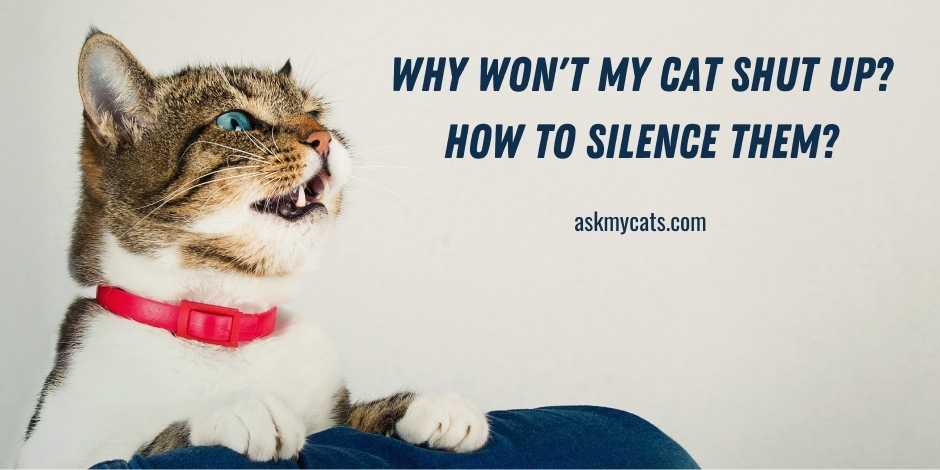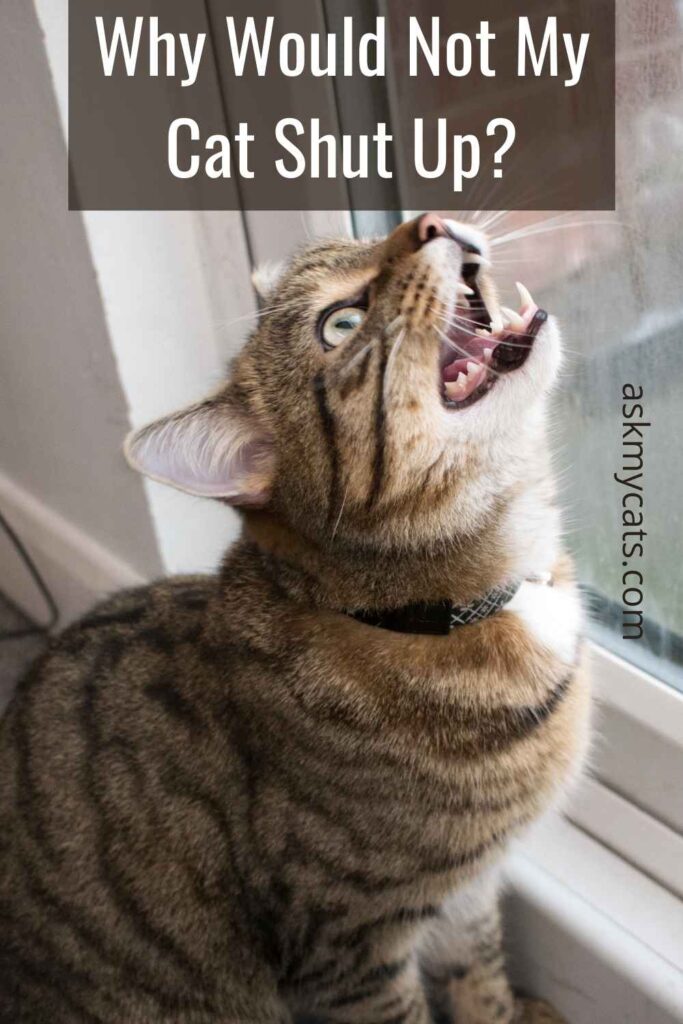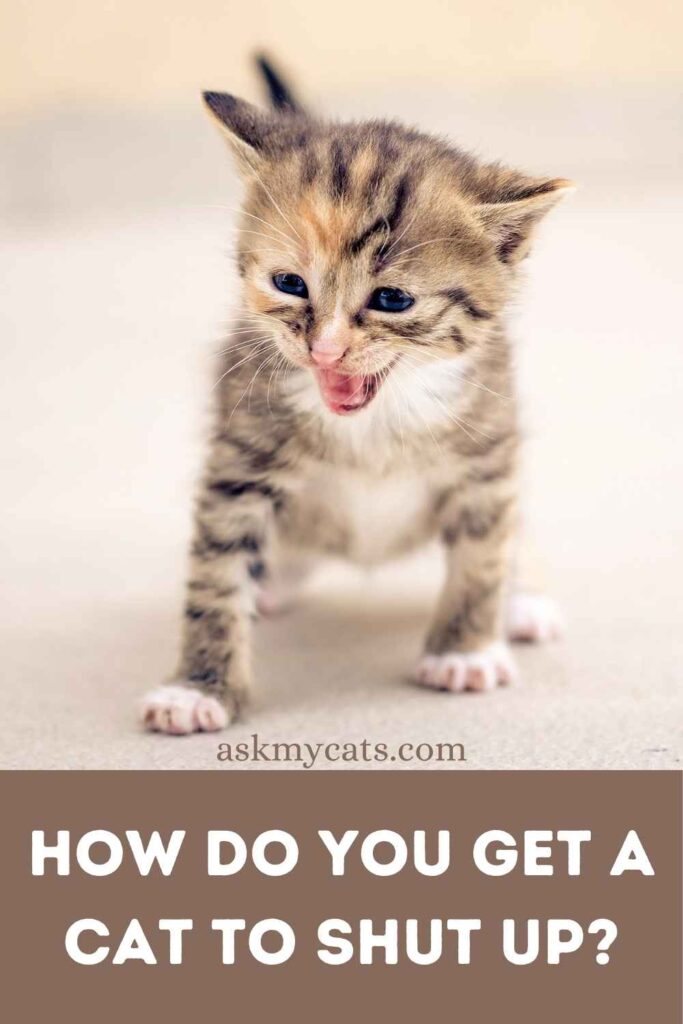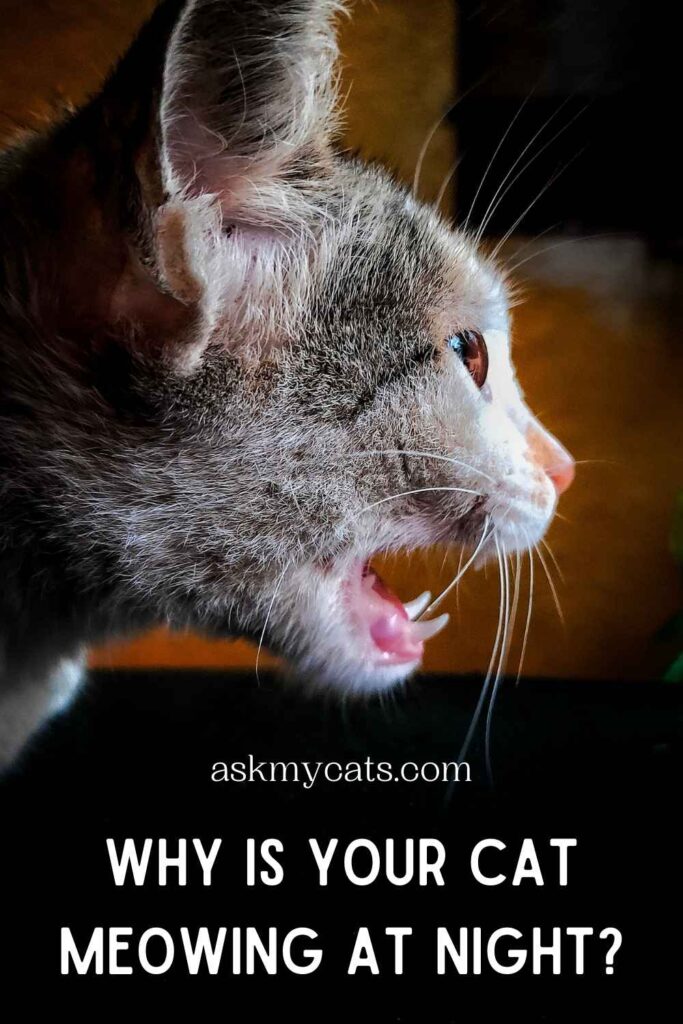Cats won’t shut up because cats are not as well socialized as humans and so they will try to protest against everything they don’t like by meowing.
They are not taught to ride in cars, wander about, or interact with a variety of people and animals. They are normally kept indoors, or they are allowed to roam freely as indoor/outdoor cats. Only a small percentage of people have cats as daily pets.
You could consider placing him in a large crate with a sheet covering it and a warm, fluffy blanket on the bottom. If they get a paw stuck or some other terrible mishap, you can only forget them as they whine.
He’s not a human, he’s a cat. Like 99.9% of all human-owned cats, he’s probably been asked to “shut up” all of a sudden, as you so bluntly said, but he’s never been in a car before.


Give Your Cat the Perfect Day
Get the Free Ebook!
Why Would Not My Cat Shut Up?
Attention-seeking, a learned trait, is the most common cause of repetitive vocalization in cats.
Many cats learn to meow to indicate that they want to be eaten or go outside. Anxiety, aggression, agitation, cognitive instability, and other behavioral issues may also lead cats to vocalize excessively.

1. Breed Matters
To begin with, the degree of vocalization is heavily influenced by breed. Persians are not chatty, whereas Orientals are. Before you adopt a cat, keep this in mind.
Quiet breeds include Abyssinians, British and American Shorthairs, Persians, Maine Coons, and Cornish Rex.
Typically, the shelter or rescue organization from which you adopt your pet will assist you in selecting one with a vocal style that matches your preferences.
Also, check out reasons behind i just adopted a cat and it won't stop meowing
2. Fix ’em!
While in heat, unspayed females will vocalize intensely even if they are silent otherwise.
They will come into heat every 18-24 days year-round if they are indoor cats (unless bred).
The sound of a cat in heat is a combination of nails-on-a-chalkboard, Tuvan humming, a six-year-old playing bagpipes, and poor accordion music.
When a male detects a female in heat, he will yowl incessantly. Whether you have your pet fixed when he or she is still a pup, the song of love will continue and you will have peace and calm.
3. Talking to YOU!
Kittens meow to communicate with their mothers when they are hungry or need more. When a cat gets older, he can stop meowing to interact with other cats.
Growls, howls, hisses, and body language are the most common ways for cats to communicate with one another while meowing is reserved for feline-human contact. If your cat meows, he’s trying to communicate with you.
You’ll be able to figure out how to silence him once you can figure out what he’s doing.
4. How They Say It Is Important
Know how your cat meows. There’s a concern if she’s always calm and rarely meows at you, but then suddenly starts vocalizing. If you can’t make out what’s wrong, take your pet to the doctor.
My cat had a wide variety of vocalizations and was exceptionally vocal. He had a greeting, a location for his little friend, a request to be allowed into the building, and a scarcely audible cranky huff as he had to say the last word. I’m sure there are a few hundred more.
As his eyesight and hearing deteriorated in the final months of his life, he developed a new vocalization. It wasn’t a distress call, but just a call of confusion, as though he didn’t know where he was or why he was there.
In geezer cats, sensory defects and cognitive dysfunction are normal, but your vet should check for underlying medical problems like hyperthyroidism or kidney failure. Medications will also improve.
Tripper, on the other hand, is still calm, even while visiting the veterinarian. I’d suspect something was up if he meowed as loudly and often as one of the Siamese cats.
I do check, even though it’s just a neighbour’s cat in the backyard.
Keep an eye on your pet to pick up on her words and delivery style. Cats have no problem expressing just what they want, according to the majority of cat people I meet.
5. Attention Deficit Disorder
Think again if you wanted a cat as a companion because you thought they were low-maintenance. They are emotional, sentient beings that, like you, need care and love.
Your cat may meow to get more quality time with you if you aren’t giving her enough attention and sensory stimuli. Play with her to lessen her calls for affection (young cats need more playtime), but not as a reward for meowing.
Wait for a moment of silence before giving your full attention. If she begins to meow again, walk away and come back when she is calm.
It will also be beneficial to teach your cat to have a set playtime per day. She is less likely to vocalize at other moments after she has been conditioned. Food follows the same pattern. After a lot of meowing, don’t offer her rice.
Before setting the food down, wait for a few moments of silence. Alternatively, switching to an automatic feeder can be beneficial. Auto feeders are particularly useful for cats that wake you up at 5 a.m. yowling.
They’ll figure out how to concentrate on the feeder and wait for it to unlock. They don’t want to be tormenting you in your bedroom while the kitchen feeder is opening up!
Try finding a playmate for your pet if you spend long hours at the office and he is home alone during the day.
Few cats like to be alone, but most cats benefit from having a companion with whom they can play and plot. Additionally, there would be fewer boredom-related behavioral issues.
6. The Doorman
Try having a pet door if your cat is indoors or outdoors and yowls to get in and out. Much better, you may build a catio outside the cat door to keep your cat safe while he or she enjoys some fresh air.
It is in a cat’s essence to desire to be outside. Butterflies are everywhere! Birds and Squirrels too! Strange odors emanating from fire hydrants and telephone poles!
However, there are far too few people who live in areas where it is safe to let cats outside. Consider putting him on a leash or purchasing a cat stroller. Every day, a short stroll or trip will satiate the outdoor explorer in him.
Interesting Read: Why Won’t My Cat Stop Meowing In Her Cage?
How Do You Get A Cat To Shut Up?
You should always give your cat the proper attention to shut him up because a cat craves the desired attention to a great extent.

If your cat is a pathetic meower — we’re talking deep, noisy, and annoying meows, not adorable little kitten chirps — they may be trying to communicate with you or just want your attention.
In any case, watching a barking kitten isn’t perfect. If your cat is verbal and this is a habit you’d like to stop, keep reading to find out what’s up with your cat and how to deal with it.
Ensure that your cat has food, drink, and a clean litter box first and foremost.
They might actually be informing you that they want more done with one of the fundamental issues.
Try taking your pet to the vet if the meowing is fresh and your cat is less chatty and more agitated. Cats that are verbal are normally attempting to connect with us.
Under this situation, it’s possible that they’re not doing well, so check with the veterinarian to make sure they’re well.
To begin, determine when your cat isn’t meowing and whether there is a trend.
Is it a certain time of day or a certain activity? Do they want to meow while you pay attention to them? When are they going to start up again?
Then try to find a way to keep doing whatever thing is causing the meowing to stop (for example, if your cat meows every time you stop playing with them, buy some new games for them to play with — they’ll obviously want to keep playing!).
Cats always meow for affection at a time when we are unable to give them our full attention. You might try to avoid them if they’re being especially chatty, but they’re unlikely to stop right away.
This is clearly aggravating and making it difficult not to pay attention to them, because you’ll most certainly give in to whatever it seems they desire, thereby perpetuating the behavior loop.
You must make an effort to interrupt the cycle! If your cat (or any other pet) receives a response from you by meowing or scratching, they may automatically repeat the action to continue receiving a response.
The first guideline is to stop listening to your cat’s meowing explicitly, whether it’s by petting, shushing, or doing anything else — any response counts, even though it’s negative.
If your cat is meowing and purring, give him a time-out. Close the door to the room you’re in and let them out to play until they finish mowing. If they meow again, they’re going back outside the fence.
They’ll eventually shape a new behavior chain, and they’ll learn that meowing gets them kicked out of the bed. This will take time and diligence above all else, however, it is absolutely possible to do (even with a mischievous kitty).
Also, check out My Cat Keeps Meowing at the Door – Find Out Why!
Why Is Your Cat Meowing At Night?
Cats have a distinct sleep-wake cycle than most species, and they are often active at night. This is due to the fact that cats are crepuscular, meaning they hunt and are busy in the evenings and early mornings.

This type of nighttime cat behavior is known as night crazies, and it can cause cat owners to lose sleep. There are some things you can do to help if your cat won’t let you sleep.
Cats are often more aggressive late at night or early in the morning. Your cat’s innate instinct to hunt and fly at these times is normally to blame.
However, there may be other causes that contribute to cats’ extreme nocturnal activity, such as:
When you’re at work or college, you should leave your cat alone at home during the day.
Your cat can spend the majority of the day sleeping or relaxing during this period.
All of the relaxation during the day will lead to a nocturnally active cat.
Hunger: Cats are known for waking up in the middle of the night to eat, which is in line with their innate desire to hunt during the twilight hours.
Boredom: If your cat spends the majority of the day alone, he or she might be lonely and seek more interaction and affection. Your pet can have excess energy or be waking you up for love because cats are social animals. This can be a fun way for your pet to interact with other cats.
Changes in sleeping habits are normal in cats as they get older. You may notice that your cat is busier at night, which could be due to health issues or the natural aging process.
Frequently Asked Questions
How do I get my cat to stop meowing constantly?
Avoid listening to attention-seeking meows if you want to reduce the number of them. Just pay attention to them while they are silent. Look or walk away if they begin to meow again. But don’t forget about your pet.
Should I ignore my cat meowing?
Don’t try to ignore her when your cat meows. The only difference is if you know she’s meowing to get you to do what she likes. While these punishments can initially send her fleeing, they are unlikely to have a long-term impact on her meowing conduct. They may, on the other hand, make her afraid of you.
Final Words
When cats have hypertension (high blood pressure), which may be caused by kidney or heart failure, they become more vocal for whatever reason.
Shimba meows louder and longer because she can’t hear her own voice any longer.
Excessive meowing in older cats may be a symptom of deafness or even kitty Alzheimer’s disease (feline cognitive disorder).
Drop down your valuable suggestions in the comments section below!
